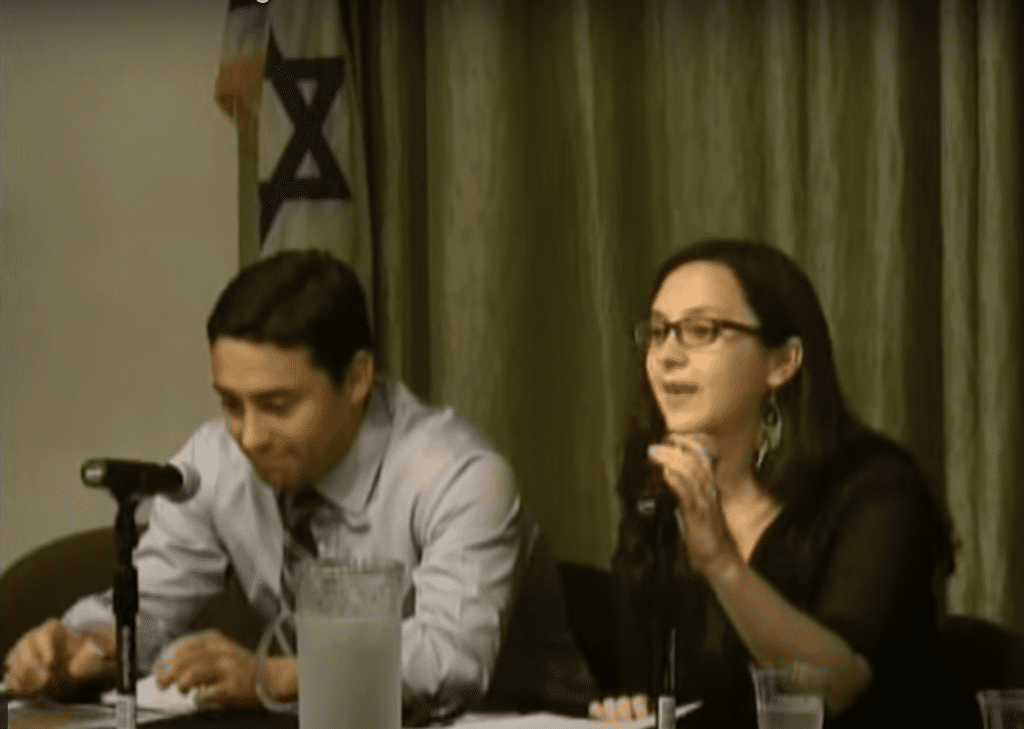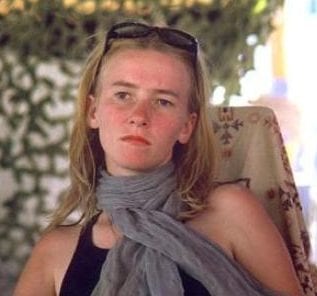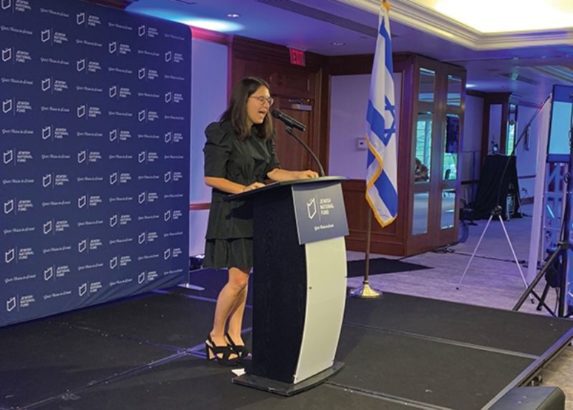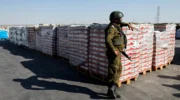Journalist Bari Weiss has positioned herself as a leader in the anti-cancel, anti-censorship movement. In reality, she has a history of working to cancel people and suppress information…
Weiss made her debut in journalism on an Israeli newspaper while living in Israel on a program whose goal is to train young Jewish Americans to bring societal change in the U.S. This is to be accomplished, its website states, by “seeding the community with a cadre of outstanding young lay leaders…”
“Upon returning from Israel, Fellows are warmly welcomed into the Alumni Network, a group of more than 400 who are eligible to receive financial awards, personal development stipends, ongoing communal learning, networking opportunities, and countless other resources.”
“For more than three decades, the program has been empowering cadres of individuals who have shaped the American Jewish landscape and beyond” through such actions as “write for top-tier publications,” “ignite social movements,” and “publish books…”
Weiss has been an exemplary alum.
By Alison Weir, excerpted from “As Twitter censorship is revealed, will Palestine remain canceled?”
Journalist Bari Weiss has a long history as a devoted Israel partisan who has in the past worked to suppress information.
Vanity Fair reports: “She is an ardent Zionist, and has come to believe that much of the anti-Zionist talk on the left is tantamount to anti-Semitism.” When Andrew Sullivan described her as a “Zionist fanatic of near-unhinged proportions,” Bari responded: “happily plead guilty as charged.”
When considering Bari Weiss, it’s necessary to examine how her philosophical stance has outwardly seemed contradictory, but, underneath, her actions appear to be based on a single, fundamental motivation. Also, as we will see, her actions sometimes parallel the strategies of an Israel-based program she attended whose goal is to bring change in the U.S.
In recent years, Weiss has endeavored to position herself as a leader in the growing anti-cancel, anti-censorship movement.
While Weiss has now joined those focused on defending individuals who’ve been unfairly “cancelled,” this is a relatively new theme for her. In the past Weiss was the one doing the cancelling (and this sometimes continues).
Her targets have often been Palestinians, Arabs, and Muslims, but many others of diverse races, religions and ethnicities have also been attacked. The common denominator has been support for Palestinian human rights.
Journalist Glenn Greenwald observed of Weiss in 2017: “Her relatively short career as a writer and activist has been overwhelmingly devoted to one issue: a defense of the Israeli government and a corresponding smear campaign against its critics.”
Below are some examples of Weiss’ actions:
• After going to Israel to live for a year, she attended Columbia University, where she tried to cancel a group of professors. The Guardian reports that Weiss “led a campaign that accused a group of professors of bias against Jewish students, and even assisted in a documentary on that theme. Columbia conducted a lengthy and costly investigation on these charges and found the allegations baseless.” More on this is here.
• During that time she also worked to take down Lisa Anderson, dean of Columbia’s School of International and Public Affairs and a renowned Middle East scholar.
• Weiss was involved in an attempt to ruin the academic career of a rising Palestinian-American professor, Nadia Abu El-Haj, “for the crime of writing a book questioning the archeological claims of the Israeli government.”
• She attacked a pro-Palestinian African-American Congressman as being allegedly antisemitic, despite abundant evidence that he was not.
• She called Tulsi Gabbard, a military veteran who often opposes militarism, an “Assad toady” who is a “mother load of bad ideas.”
• In 2019 she praised an over the top column condemning a campus invitation to Jewish-American cartoonist Eli Valley that compared his work to Nazi propaganda. Valley is known for satirizing Israel’s occupation of Palestine and its ruthless attacks on Gaza.
• She authored a book that disparaged non-Zionist Jewish Americans as “antisemitic.” Journalist Philip Weiss described it as “’cancel culture’ on steroids.” He noted that her weapons are “censorship and suppression.”
• She “smeared anti-Zionists with the kind of attacks she calls McCarthyism when used on her, for instance saying they’re as dangerous as white nationalists.”
• She used her position at the New York Times to systematically bar “any op-ed or letter to the editor contrary to the orthodoxy of the pro-Israel establishment she represents.”
Weiss’ world emphasizes Israel
In Weiss’s Israel-centric world view, fundamental facts are largely ignored or misrepresented.
Following are some examples of facts she omits: that Israel was established through a war of ethnic cleansing against the majority inhabitants of the land that zionists desired for a Jewish state; that Palestinians, both Muslims and Christians, are living in the virtual prisons that Gaza and the West Bank have become; that many of them are refugee families whose lands and homes were stolen by Israel in 1948 and 1967; that it is Israel that is the prime purveyor of violence in the “conflict” and is the party that most often initiates it.

In Weiss’s often hyperbolic, inaccurate assertions, Palestinians who fight back are allegedly “terrorists,” and those who support them are “antisemites.” Yet, despite her fervent identification with Israel, she works to position herself as a moderate, and voices support for a “two-state solution.”
This position may sound reasonable, fair, and Palestinian-friendly. However, many informed analysts now consider this long-discussed compromise an impossibility due to Israel’s continual settlement expansion on Palestinian land. In addition, an examination of this alleged “two-state solution” reveals that it would consist of one state, Israel, on approximately 90 percent (or more) of the land, and a second, barely viable state, Palestine, on the remainder – possibly consisting of several noncontiguous areas.
Which lives matter?
For Weiss, it appears, Israeli lives matter, while Palestinian lives often do not. A May 8th tweet by Weiss is indicative of her outlook.
In it, Weiss refers to “weeks of terror attacks in Israel during which 15 people were murdered.” She ignores the many more Palestinians killed during the same time and before.
Let’s look at the facts:
- 18 Israelis tragically died during May 5 through March 24. During that time 26 Palestinians also tragically died, including a one-year-old.
- If we extend the range back to March 1, it turns out that 35 Palestinians had been killed, and 18 Israelis.
- If we extend the range back to the beginning of the year, it turns out that 48 Palestinians had been killed and 19 Israelis. (Two of these were foreign workers, who are not given Israeli citizenship.)
- If we look at those killed in the previous year, we find that 279 Palestinians had been killed and 13 Israelis.
In the days following Weiss’ tweet, Israeli forces killed over 100 Palestinians, including an American journalist and a number of children and toddlers. Weiss did not tweet about these deaths. One Israeli was also killed, an invading soldier.
Commitment to Israel seems central to Weiss’ identity, and she has spent considerable time there. Her first extended stay was living for a gap year in Israel after high school, studying at a feminist yeshiva and at Israel’s Hebrew University of Jerusalem. It appears that this was in 2002-2003.
During that time Israeli forces were brutally putting down a major Palestinian uprising against Israeli occupation called the Second Intifada. In 2002 and 2003 the Israeli military killed 1,621 Palestinians, 342 of them children, while Palestinian resistance fighters killed 185 Israelis, 66 of them children.
During the time, Israeli forces killed 23-year-old American peace activist Rachel Corrie, killed British UN official Iain Hook, shot 21-year-old British photographer Tom Hurndal in the head as he was trying to help Palestinian girls under Israeli fire (he died after an 11 month coma), and attacked 24-year-old American peace activist Brian Avery, shattering his face (he survived but has undergone years of surgery to put his face back together).
Internet searches failed to turn up any mentions by Weiss of any of these deaths in her many articles and speeches about Israel, despite the fact that the incidents were covered by Israeli media and there was significant dissent in Israel while she was presumably there.

Israel-trained ‘cadres’ influence change in the U.S.
By her own admission, Weiss got involved in journalism through her pro-Israel activism during college (described above). She indicates that her later decision to move from the Wall Street Journal to the New York Times was to expand her reach on Israel.
Weiss made her debut in journalism on an Israeli newspaper following her graduation from Columbia. She was living in Israel on a Dorot Fellowship, an extraordinary program whose goal is to train young Jewish Americans in Israel to bring societal change in the U.S. This is to be accomplished, according to its website, by “seeding the community with a cadre of outstanding young lay leaders.”
The program, a project of the $91 million Dorot Foundation, “provides the tools, mentorship, financial resources, time, and space for self-exploration that allows individuals to achieve their potential as agents of social change.” Among other things, Fellows “return to their communities with a sophisticated understanding of the socio-political reality in Israel.”
“Upon returning from Israel,” the website states, “Fellows are warmly welcomed into the DFI Alumni Network, a group of more than 400 who are eligible to receive financial awards, personal development stipends, ongoing communal learning, networking opportunities, and countless other resources.”
Dorot boasts: “For more than three decades, the Dorot Fellowship has been empowering cadres of individuals who have shaped the American Jewish landscape and beyond” through such actions as “write for top-tier publications,” “ignite social movements,” and “publish books.”
Weiss has been an exemplary Dorot alum.
Among other things, she’s held top positions at the Wall Street Journal and the New York Times, published a book on “How to Fight Antisemitism” (the launch party was covered in detail by New York magazine and featured such luminaries as the publisher of the New York Times, the chair of ViacomCBS, and an MSNBC anchor), been interviewed on major TV and Internet programs, become a prominent influencer in a new social movement, received diverse awards, and was listed number seven in the Jerusalem Post’s “50 most influential Jews of 2019″ (well ahead of Ruth Bader Ginsburg, who tied for 15).
Not everyone, however, is impressed with Weiss. While Weiss’s recent articles on cancel culture are often valid, her claims frequently come across as overstated and hypocritical to those familiar with her history.
Glenn Greenwald describes her as “a writer who thrives on cheap, easy, and superficial ‘controversy,’ who sees herself as a brave intellectual dissident as she is continually celebrated by and gets promoted within the most mainstream media circles.”
Political commentator Krystal Ball notes:
“There is no issue of legitimate inquiry which is more likely to get you ‘cancelled’ than support for Palestinian rights. That Bari Weiss, an intellectual architect of that regime of censorship, has the audacity to ‘self-expel’ and cry cancellation is outrageously hypocritical.”
Weiss’ selective opposition to cancel culture position, while presumably often sincere, may have an additional motivation. Like the original neocons before her (leftists who became ‘conservatives’ when the left began to support Palestinian rights), Weiss’ new persona may have as much to do with her Israel agenda as with devotion to free speech – particularly since she advocates for a country that has long practiced official censorship.
There are indications that Weiss has received special treatment at Twitter according to a recent report. According to Twitter employees, Weiss “was given access to Twitter’s employee systems, added to its Slack, and given a company laptop.”
The level of access to Twitter systems given to Weiss is typically given only to employees, one of the people familiar said, though it doesn’t seem she is actually working at the company. Matt Taibbi, the other newsletter writer through whom Musk has released the Twitter files, didn’t seem to receive this degree of access, the person added. – Business Insider
On the day that Weiss published her first Twitter Files entry – guaranteed to receive voluminous traffic – Weiss launched a new, apparently abundantly-funded anti-censorship media company that features a number of valuable writers in the field.
It appears that Weiss continues to be on a roll. This could have significant consequences.
If Weiss does manage to leap to the front of the anti-cancel movement, as it appears she’s attempting, her outsized influence could cause other participants to defer to her on Israel-Palestine and steer them away from opposing the cancellation of Palestinians and of those who support their inalienable rights.
The first test will be what the Twitter Files project decides to investigate, and what it does not.
RELATED:
- A Pro-Israel Nonprofit is Funneling News Content Through Bari Weiss’s “Free Press”
- How much is shoddy, pro-Israel journalism worth? Ask Bari Weiss
Alison Weir is executive director of If Americans Knew, president of the Council for the National Interest, and author of Against Our Better Judgment: The Hidden History of How the U.S. Was Used to Create Israel. She first spent time in Gaza and the West Bank in early 2001 as a freelance journalist.





